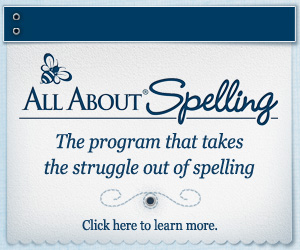Spelling has been an area of frustration in my house for my oldest son and I. I have never struggled with spelling because I could just look at a word and visually remember how to spell it. Traditional spelling lists, copying lists and spelling tests were all I needed to learn to spell. So I haven't known how to help him when he struggles. We have tried so many different programs.... Sing, Spell, Read and Write, Spelling Power, Sequential Spelling and MCP Spelling Workout. After giving each of these popular methods a pretty good try, we just weren't getting anywhere with our spelling progress. I'm sure that these methods work well for many people, in fact, they had been recommended by respected friends, but we were not making any progress.
Then I found All About Spelling!
All About Spelling teaches phonograms, spelling rules and spelling strategies all with a multi sensory approach that is fun for kids. We have completed levels 1 through 4 so far, with two of my boys, so my comments will be with those levels specifically in mind.
Here is what a lesson looks like:
First you will review any phonograms (letters or letter combinations that represent a single sound.) Flashcards are used for this part. Next you will teach a new concept, like a new phonogram or a new spelling rule or generalization. These lessons are scripted so that you don't have to do too much prep beforehand. As the lessons progress, the child will begin to use magnetic tiles to combine the phonograms into words, a really great hands on method to practice spelling. Eventually, you will begin dictating phonograms, then words, then phrases and then complete sentences over the course of the seven different levels of the program. (We use little personal whiteboards for this part of the activity, which seems to make it more fun - no more pages of spelling lists stacking up in the folders!)
What we love most about it:
- I love how easy it is to use - virtually no prep after the initial set-up (which just involves cutting out the phonogram tiles and affixing the magnets). The lessons are paced well and easy to follow.
- I love that it teaches spelling rules, not just patterns. There are always exceptions to the rules, but these aren't introduced until the basic rules are solidly understood.
- I love that spelling words are taught within the context of phrases and sentences. I used to find that the boys could reproduce the spelling "list" correctly with other methods, but couldn't ever spell a word correctly within the context of writing a sentence. All About Spelling gives plenty of practice using spelling words in real contexts (which really helps with all those homophones!)
- I love the reinforcement of the concepts from level to level. Because we are spelling phrases and sentences, (not just isolated lists of words) even the easier words continually get reviewed as they are used in sentences.
- The boys love the phonogram tiles and the sentence dictation (believe it or not!) Really, I think it's the white boards....
- The boys love marking their progress on the progress charts.
Drawbacks?:
- Price. AAS is more expensive for a years worth of instruction than some of the other programs I have tried. (However, all the other programs I tried are sitting on my shelf, or need to be sold at a curriculum fair, so I guess that makes them money thrown away.) I will be using AAS with all three of my boys, so I guess that cuts the cost of the program into thirds, and now it's not looking so bad after all. $39.99 per level divided by three kids = $13.33 per level per kid. Not bad at all.
- There really isn't any other drawbacks that I have discovered so far!
AAS Bonuses:
- The All About Spelling website has great helps and tips for particular spelling problems that you have. I just found this great article today about helping your child with his "b's" and "d's"!
- All About Spelling has a one year money back guarantee, so if you try it out and it doesn't work, it won't be sitting on your shelf, or waiting to go to the used curriculum fair. You can just get your money back.
- All About Spelling has a reading program too. All my kids have learned how to read before we found the spelling program, so I haven't used it, but I would definitely look into it if I had another one to teach reading to.
If you are looking for a spelling program, or don't like the spelling program that you have now, I highly recommend checking out All About Spelling!
Disclosure: This post contains affiliate links. I don't review or recommend any product that I haven't tried or don't fully believe in.





